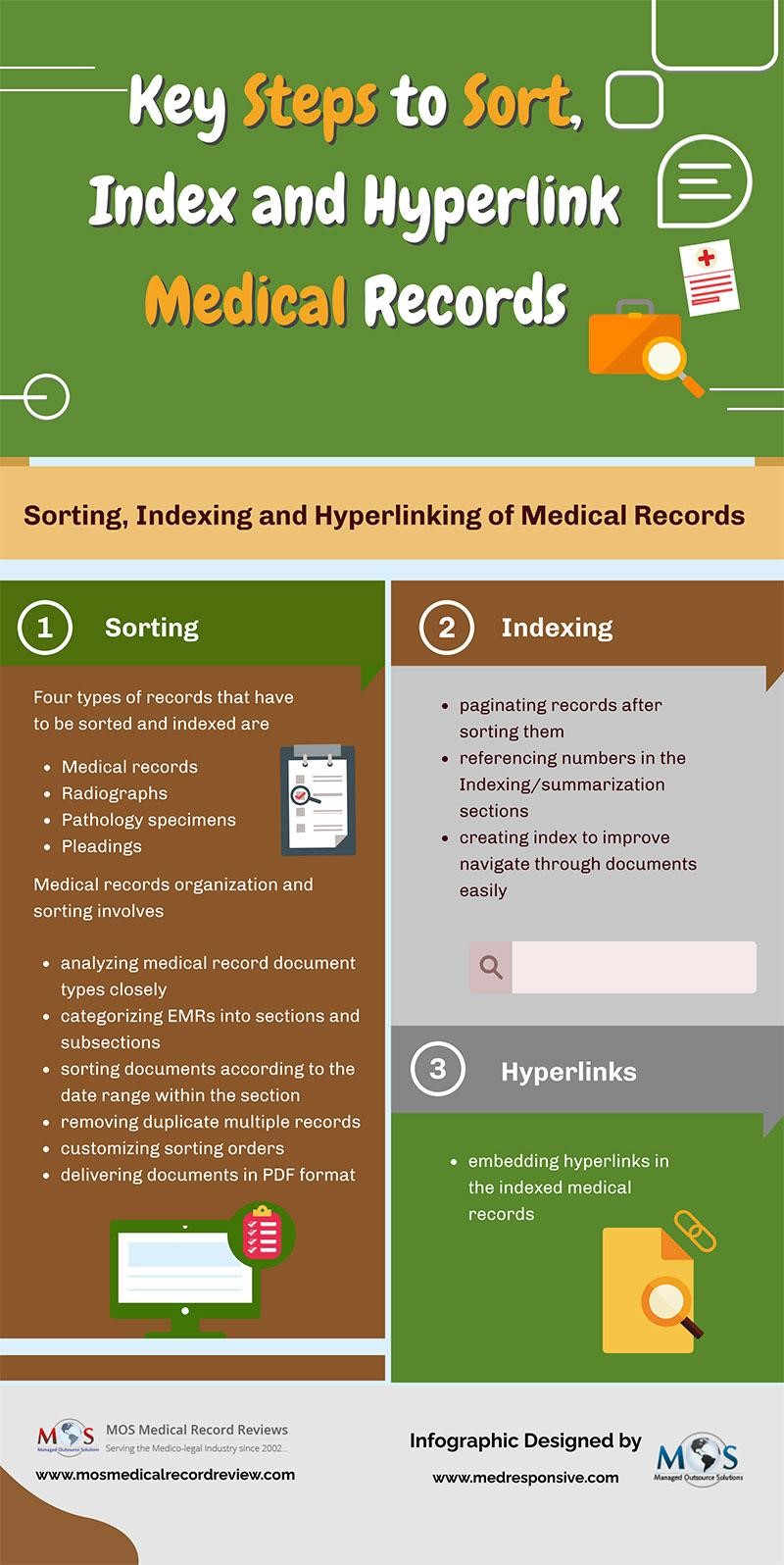Imagine a courtroom scenario where a case regarding medical malpractice is being heard and the plaintiff attorney is sifting through stacks of medical records, in an attempt to urgently extract critical information from the sea of intricate documents. It is not at all easy and the efficiency of timely accessing vital medical details can impact the legal outcome.
Disorganized medical records weaken claims, delay settlements and increase the costs of legal procedure. However, properly sorted, indexed, and hyperlinked medical records can be the turning factor, giving you the access to go through vast amounts of information – quickly and efficiently, thereby turning the outcome in your favor.
Following systematic strategies for sorting, indexing, and hyperlinking medical records and proper medical record organization allows for a seamless access to evidence, helping attorneys strengthen claims, improve efficiency, and achieve better outcomes for their clients.
What Is the Role of Medical Records in Legal Cases?
Medical records serve as the prime evidence in medico-legal litigation. Whether it is to prove causation in a personal injury lawsuit, establishing the extent of damages in a worker’s comp claim, or identifying negligence in a medical malpractice claim, medical records help attorneys in precisely locating crucial evidence among the documents.
An organized approach to medical records management benefits legal professionals in several ways:
- Better Case Preparation – Instant access to medical data, physician notes, and lab results that helps build a solid argument.
- Stronger Litigation Strategy – Because vital information is now readily available, attorneys can better respond to opposing counsel and expert witnesses.
- Quicker Settlement Negotiations – Comprehensive medical records enable attorneys to present clear and compelling evidence, expediting negotiations.
- Compliance and Due Diligence – Thoroughly indexed and hyperlinked records ensure that attorneys meet deadlines and legal disclosure requirements.
Sorting Medical Records: Establishing a Legal Roadmap
Sorting medical records is the first step in making them accessible and useful during a litigation process. A well-defined classification system helps attorneys navigate thousands of pages of records with relative ease.
Best Sorting Strategies:
- By Document Type: Arrange records into categories such as physician notes, imaging reports, lab results, operative summaries, and billing statements.
- By Chronology: Sort documents in chronological order to establish a clear timeline of medical events, helping in building causation and continuity of care.
- By Provider: Group records by healthcare provider or facility to identify treatment rendered through multiple sources.
- By Relevance: Identify records directly supporting a claim and organize them according to criteria like: demonstrating injury severity, treatment delays, or conflicting medical opinions.
Sorting medical records systematically enables attorneys to efficiently retrieve relevant documents without sifting through excessive, unrelated information.
Indexing Medical Records: Accelerating Legal Analysis
After sorting, indexing begins by assigning labels, references, or specific identifiers to medical documents, thereby making them easy to locate. An effective index acts as a roadmap, helping attorneys to find the documents they are looking for, without any delay.
There are two main types of indexing systems:
- Manual Indexing: Manual labeling of documents with identifiers like patient IDs or file titles. Ideal for smaller healthcare clinics, as it is laborious and error-prone.
- Electronic Indexing: Assigns digital identifiers using metadata and tags by EHR systems to index records, thereby facilitating their quick and accurate retrieval via keyword searches or filter options.
Best Practices for Indexing:
- Use Standardized Categories: Label sections legibly—diagnostic tests, physician notes, surgeries, prescriptions, etc.
- Apply Metadata for Searchability: Add patient ID, date of service, and provider name to digital files for quick searches.
- Create a Summary Table: Develop an easy-to-read summary listing key medical events, treatments, and providers.
- Highlight Crucial Evidence: Flag entries that substantiate legal claims, such as discrepancies in medical opinions or delayed treatments.
A well-organized index saves attorneys significant time in reviewing records, allowing them to focus on case strategy rather than document hunting.
Hyperlinking: The Key to Instant Access
Hyperlinking is another key task that transforms static medical records into dynamic, easily navigable documents. Attorneys, who are dealing with thousands of pages of medical records, can now jump from, say, a summary page to the original document with just a click.
Advantages of Hyperlinked Medical Records:
- Instant Cross-referencing: Hyperlinking enables interconnecting related records with ease like physician notes to test results, treatment plans to billing records, and operative reports to follow-up consultations.
- Faster Case Review: Hyperlinking allows seamless communication between documents without having the need to scroll through hundreds of pages and reduce any chances of manual error.
- Better Deposition and Trial Preparation: Gain quick access to important medical details during witness questioning or raising any argument in the courtroom.
- Reduced Risk of Missing Key Details: When related documents are linked together, any chances of overlooking crucial pieces of evidence are eliminated/mitigated.
Hyperlinked records significantly improve an attorney’s ability to work efficiently, whether preparing for mediation, trial, or settlement negotiations.
How to Implement an Effective Medical Record Organization Strategy
Legal professionals can implement a structured system for sorting, indexing, and hyperlinking medical records by following these steps:
- Evaluate Existing Record Management Practices – Identify discrepancies and decide whether manual or digital organization improvements are required.
- Set Standard Procedures – Establish clear guidelines for categorizing, indexing, and linking medical records consistently.
- Leverage Technology – Invest in advanced technology like, a legal case management software that supports medical record organization and hyperlinking.
- Educate Legal Teams – Ensure attorneys, paralegals, and support staff are proficient in using organized medical records.
- Conduct Periodic Reviews – Regularly audit medical record organization systems to ensure continued efficiency.
Why Collaborate with MOS for Professional Medical Record Review Services?
Attorneys dealing with complex medical records can benefit immensely from professional medical record review services. Managed Outsource Solutions (MOS) specializes in medical record organization tailored to the legal industry.
Why Choose MOS?
- Legal-centric Medical Record Sorting: Our team organizes medical records based on legal relevance, ensuring attorneys can quickly access key evidence.
- Comprehensive Indexing for Improved Navigation: We create easy-to-navigate indexes tailored to case needs, saving time and improving efficiency.
- Prompt Hyperlinking for Instant Access: We embed hyperlinks for seamless document navigation, making deposition and trial preparation easier.
- Compliance and Accuracy Assurance: Our team ensures HIPAA-compliant handling of records, maintaining data integrity and confidentiality.
With MOS, attorneys can focus on case strategy while we handle the complexities of medical record organization. Let us help you maximize efficiency, strengthen arguments, and gain a competitive edge in legal proceedings.
Build Cases That Win with Organized Medical Records
Partner with us. Gain that competitive advantage in the litigation process!





